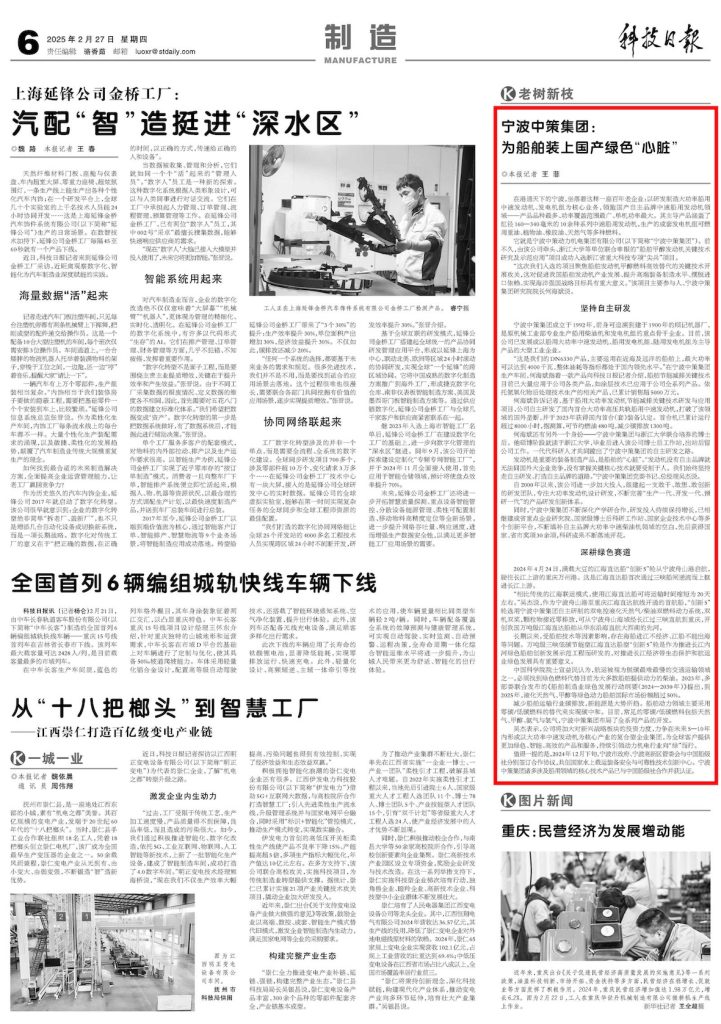Ningbo CSI Group: Powering Ships with a Domestic Green "Heart"
In the port city of Ningbo, there is a century-old enterprise dedicated to the research, development, and manufacturing of high-power medium-speed marine engines and generator sets. It leads the Chinese market in medium-speed marine engines, offering the most extensive product range, the widest power coverage, and the highest single-unit power output. Its core products include over ten series of medium-speed marine engines with bore diameters ranging from 160 to 340 mm. The generator sets it produces can run on various fuels, including HFO, bio fuel oil, rubber oil, and natural gas.
This enterprise is Ningbo C.S.I. Power & Machinery Group Co., Ltd. (hereinafter referred to as “Ningbo CSI Group”). Recently, the project “Key Technology Research and Demonstration Application of Methanol Marine Engines,” led by CSI Group in collaboration with Zhejiang University and other institutions, was successfully selected as a “Pioneer” project under Zhejiang Province’s major science and technology initiatives.
“This project focuses on the critical technology for the efficient substitution of methanol fuel in marine engines. It is of great significance for the development of China’s marine engine industry, enhancing high-end equipment manufacturing capabilities, reducing reliance on imports, and achieving the national maritime power strategy,” said Dr.He Haibin, general manager of the Ningbo C.S.I. Power & Machinery Research Institute and a key participant in the project.
Commitment to Independent R&D
CSI Group was founded in 1992, tracing its origins back to the Shunji Machinery Plant, established in 1900. It was a key enterprise under the former Ministry of Machinery Industry specializing in the production of marine diesel engines and generator sets. Today, it has grown into a large industrial enterprise with a focus on high-power medium-speed marine engines, marine generator sets, and land-based generator sets.
“This is CSI DN6330 model, primarily used in coastal and ocean-going vessels. It has a maximum power output of 4,000 kW, with fuel consumption and other key performance indicators leading the domestic market,” Dr.He Haibin explained during a tour of the production workshop. CSI Group has extensively applied marine energy-saving and emission reduction technologies to its products, such as coating technology for fuel efficiency improvement, which is now used across all its product lines. Additionally, its NOx after-treatment technology has been implemented in products that have already achieved over 50 million yuan in cumulative sales.
Dr.He Haibin further revealed that, through the CSI’s research and application of key energy-saving and emission-reduction technologies for high-power marine engines, CSI Group independently developed China’s first high-power common-rail medium-speed marine engine, breaking foreign monopolies in this sector. In 2023, this engine received certification as China’s first domestically produced (first set) equipment, and its prototype has already accumulated over 8,000 hours of operation, saved 480 tons of fuel and reduced 1,300 tons of carbon emissions.
In addition to his corporate role, Dr.He Haibin is also a postdoctoral researcher co-trained by Ningbo CSI Group and Zhejiang University. After completed his doctorate at Zhejiang University, he joined the CSI Group’s national postdoctoral research station and later became a full-time researcher, embodying the company’s commitment to nurturing scientific talent.
“Engines are a crucial part of advanced manufacturing and serve as the ‘heart’ of ships,” said Wu Jie, Party Secretary and General Manager of Ningbo CSI Group. “Without a domestic brand, we cannot compete with large foreign enterprises, and without mastering core technologies, we will always be at their mercy. That is why we insist on independent research and development and building our own brand.”
Since 2000, the company has ramped up R&D investment, forming a bold and innovative team dedicated to high-power engine development. It has perfected a “produce one generation, develop the next, research the future” innovation system.
Additionally, Ningbo CSI Group has deepened industry-academia collaboration, continuously increasing R&D spending. It has established multiple innovation platforms, including a provincial key enterprise research institute, a national postdoctoral research station, and a national enterprise technology center. These efforts have filled gaps in domestic high-power medium-speed diesel engines, earning over 30 national and provincial awards and turning R&D achievements into real-world applications.
Deepening Focus on Green Technology
On April 24, 2024, the “Chuang Xin 5” ship, loaded with soybeans, set sail from Ningbo Zhoushan Port to Chongqing Wanzhou Port – marking the first time a Yangtze River direct shipping vessel successfully navigated upstream through the Three Gorges Dam.
“Compared to the traditional river-sea intermodal transportation model, using direct Yangtze River-sea vessels can reduce transit time to around 20 days,” Wu Jie explained. As the maiden voyage ship for the Ningbo-Zhoushan to Chongqing Yangtze River direct shipping route, “Chuang Xin 5” is powered by a dual electronic control liquefied natural gas (LNG)/diesel dual-fuel propulsion system independently developed by CSI Group. Featuring a twin-engine, twin-propeller design, the ship achieves near-zero particulate emissions and can sail directly from the East China coast, through the Yangtze River, across the Three Gorges, and into the Southwest region – a first for China’s 10,000-ton Yangtze River direct shipping vessels.
For a long time, technical constraints in ship design have made it uneconomical for seagoing ships to enter rivers and impossible for river ships to operate at sea. The “Chuang Xin 5” vessel, a low-carbon, energy-efficient Yangtze River direct shipping model, is a demonstration project for promoting green shipping in the Yangtze River Economic Belt, playing a crucial role in environmental protection and sustainable shipping development.
According to Academician Xuan Yimin from the Chinese Academy of Sciences, the shipping industry is one of the hardest sectors to decarbonize, making the search for alternative green fuels essential. In 2023, multiple ministries in China jointly released the “Green Development Action Plan for the Shipbuilding Industry (2024-2030),” which targets that by 2025, over 50% of new vessels in the international market will use alternative fuels such as LNG and methanol.
Reducing carbon emissions in shipping is an inevitable trend. In the maritime power sector, achieving carbon neutrality relies primarily on replacing conventional fuels with zero-carbon/low-carbon alternatives. The most common options today include natural gas, methanol, ammonia, and hydrogen. Ningbo CSI Group is actively developing a full range of products based on these alternative fuels.
Wu Jie stated that CSI Group will increase investment in strategic emerging sectors and strive to establish itself as a diversified corporate group within the next 5 to 10 years, with high-power medium-speed engines as its core industry. The company aims to provide greener, smarter, and more efficient products and services to global customers, continuing to lead the power equipment industry towards sustainable development.
Notably, in December 2024, the Ningbo Municipal Government, Ningbo High-Tech Zone Administrative Committee, and China Classification Society (CCS) signed a cooperation agreement to jointly establish the National Waterborne Transport Equipment Safety and Reliability Innovation Center. Many of CSI Group’s core marine technology products have already been certified through collaborations with CCS.

